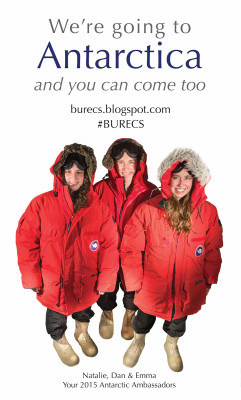
Two Boston University students will be the first undergraduates to participate in the BU Research Education and Communication of Science program’s fieldwork program in Antarctica. Emelia Chamberlain and Natalie Robinson, along with BURECS Director David Marchant and doctoral student Andrew Christ, will be leaving for Antarctica on Oct. 28. Chamberlain, Robinson and Marchant will be returning Dec. 19, while Christ will remain until Jan. 19, 2016.
Research and study will be conducted on the volcanic islands and peninsulas of McMurdo Sound and in the dry valleys of the Transantarctic Mountains, Marchant, chair of the Department of Earth and Environment, wrote in an email. Having led 25 expeditions to Antarctica with graduate students, Marchant said this year the group will focus on discovering whether the West Antarctic ice sheet has contributed to rapid sea level rise in recent years.
Throughout the journey, the group in will be assisted in their fieldwork by a virtual element in BU’s Digital Image Analysis Lab, BURECS’ website states. Those in the lab will have access to real-time satellite imagery that can accommodate the group’s analytical and strategical needs, according to the website.
Twenty-seven students, comprised of eight sophomores and 19 freshmen, will remain at BU and assist with the expedition through the lab or mission control, Marchant wrote.
Marchant said he was excited to be able to formally include BU undergraduates in this expedition, which is funded by the National Science Foundation and NASA.
“The students are learning a great deal,” Marchant said. “They will triple what they have learned in 1.5 years of the program in just a few weeks in the field.”
Chamberlain and Robinson, both sophomores in the College of Arts and Sciences, said they are thrilled to have the opportunity to explore another continent while simultaneously conducting research in their field of interest.
Chamberlain said she is very excited to depart for Antarctica. Although she has been highly occupied with daily lab work from 9 a.m. to 5 p.m. preparing for the trip, she said the hard work the group has done is further piquing her interest in the project.
“It’s a once in a lifetime opportunity,” she wrote in an email. “The prospect of camping in the coldest, most isolated place on Earth is mildly daunting. But I mean, I could possibly stand on land that has never before been touched by humans! So overall I’m very excited.”
As an aspiring environmental science major, Chamberlain joined BURECS her freshman year and is intrigued by the idea of combining science and communication to educate the general public about climate change.
“I’m sure I will learn many skills I never expected to [during this trip],” said Chamberlain. “I’m excited by both how much I will learn through this trip and the sheer adventure of it.”
Robinson said she looks forward to the hands-on experience and feels very lucky to have this opportunity early in her college career. Robinson said she will be living in a tent with two people without additional heat and expects it to be both a physical and mental challenge.
“There is so much that will happen that I can’t really anticipate,” she wrote. “I feel like I won’t really know what’s going to happen until I get there and start working. There is a lot of unknown and I think a lot of it will be learning by doing.”
The fact that Antarctica has little anthropogenic impact excites her the most, Robinson said.
“Humans haven’t yet harmed or altered this continent directly,” she said. “The thought of walking on land that no person has ever walked on amazes me.”
Christ, a third-year doctoral student in the Graduate School or Arts and Sciences, said he is thrilled to be able to incorporate undergraduate students into the program. The upcoming Antarctic expedition will be Christ’s third with Marchant, he said.
“Each year I learn a lot and get more excited every time,” Christ said. “It will be really amazing to bring down some undergraduates who have never been before and teach them about the science that we’re doing and have them participate.”
Several students said the program fascinates them and thought that it would be interesting to travel to such a remote location for something research-related.
Michael Choate, a freshman in the College of Communication, said he thinks the program will be beneficial to both the BU community and the environment.
“It’ll be really helpful for the environment,” Choate said. “The ice caps are melting and we obviously need to figure out why it’s happening.”
Mia Lomasney, a freshman in CAS, said the program will help further environmental research and development as it also broadens the spectrum of BU’s research.
“Antarctica is a very different place [to go],” Lomasney said. “The research done there will help benefit both BU and other organizations researching the same thing.”























































































































